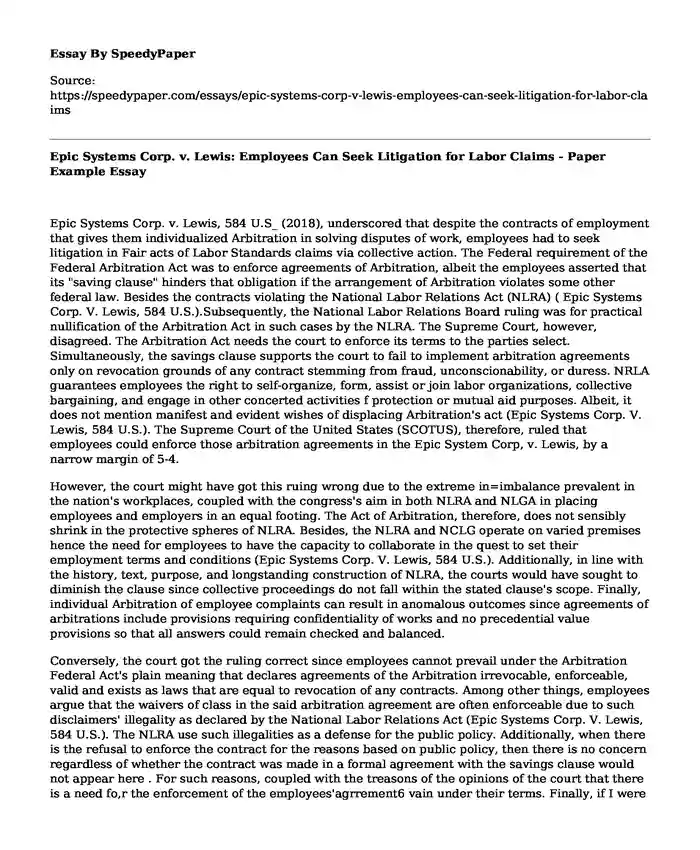
| Type of paper: | Essay |
| Categories: | Employment |
| Pages: | 3 |
| Wordcount: | 606 words |
Epic Systems Corp. v. Lewis, 584 U.S_ (2018), underscored that despite the contracts of employment that gives them individualized Arbitration in solving disputes of work, employees had to seek litigation in Fair acts of Labor Standards claims via collective action. The Federal requirement of the Federal Arbitration Act was to enforce agreements of Arbitration, albeit the employees asserted that its "saving clause" hinders that obligation if the arrangement of Arbitration violates some other federal law. Besides the contracts violating the National Labor Relations Act (NLRA) ( Epic Systems Corp. V. Lewis, 584 U.S.).Subsequently, the National Labor Relations Board ruling was for practical nullification of the Arbitration Act in such cases by the NLRA. The Supreme Court, however, disagreed. The Arbitration Act needs the court to enforce its terms to the parties select. Simultaneously, the savings clause supports the court to fail to implement arbitration agreements only on revocation grounds of any contract stemming from fraud, unconscionability, or duress. NRLA guarantees employees the right to self-organize, form, assist or join labor organizations, collective bargaining, and engage in other concerted activities f protection or mutual aid purposes. Albeit, it does not mention manifest and evident wishes of displacing Arbitration's act (Epic Systems Corp. V. Lewis, 584 U.S.). The Supreme Court of the United States (SCOTUS), therefore, ruled that employees could enforce those arbitration agreements in the Epic System Corp, v. Lewis, by a narrow margin of 5-4.
However, the court might have got this ruing wrong due to the extreme in=imbalance prevalent in the nation's workplaces, coupled with the congress's aim in both NLRA and NLGA in placing employees and employers in an equal footing. The Act of Arbitration, therefore, does not sensibly shrink in the protective spheres of NLRA. Besides, the NLRA and NCLG operate on varied premises hence the need for employees to have the capacity to collaborate in the quest to set their employment terms and conditions (Epic Systems Corp. V. Lewis, 584 U.S.). Additionally, in line with the history, text, purpose, and longstanding construction of NLRA, the courts would have sought to diminish the clause since collective proceedings do not fall within the stated clause's scope. Finally, individual Arbitration of employee complaints can result in anomalous outcomes since agreements of arbitrations include provisions requiring confidentiality of works and no precedential value provisions so that all answers could remain checked and balanced.
Conversely, the court got the ruling correct since employees cannot prevail under the Arbitration Federal Act's plain meaning that declares agreements of the Arbitration irrevocable, enforceable, valid and exists as laws that are equal to revocation of any contracts. Among other things, employees argue that the waivers of class in the said arbitration agreement are often enforceable due to such disclaimers' illegality as declared by the National Labor Relations Act (Epic Systems Corp. V. Lewis, 584 U.S.). The NLRA use such illegalities as a defense for the public policy. Additionally, when there is the refusal to enforce the contract for the reasons based on public policy, then there is no concern regardless of whether the contract was made in a formal agreement with the savings clause would not appear here . For such reasons, coupled with the treasons of the opinions of the court that there is a need fo,r the enforcement of the employees'agrrement6 vain under their terms. Finally, if I were the 10th Justice, I would descent the ruling following the extreme imbalances in the nation's workplaces and because the arbitration act does not shrink in the protective spheres of NLRA.
Work Cited
"Epic Systems Corp. V. Lewis, 584 U.S. ___ (2018)." Justia Law,supreme.justia.com/cases/federal/us/584/16-285/#tab-opinion-3904210.
Cite this page
Epic Systems Corp. v. Lewis: Employees Can Seek Litigation for Labor Claims - Paper Example. (2023, Nov 28). Retrieved from https://speedypaper.net/essays/epic-systems-corp-v-lewis-employees-can-seek-litigation-for-labor-claims
Request Removal
If you are the original author of this essay and no longer wish to have it published on the SpeedyPaper website, please click below to request its removal:
- Free Essay Describing Firms in International Trade
- Essay Example on Employee-Monitoring Software
- Free Essay. Promotion and Resistance of Slavery
- Free Essay Example. Trans-Border Security
- Essay Example: The Effects of Major Corporations Paying Low Wages
- Ethics in Business: Benefits of Ethical Leadership - Essay Sample
- Essay Example: Raising the Minimum Wage
Popular categories




